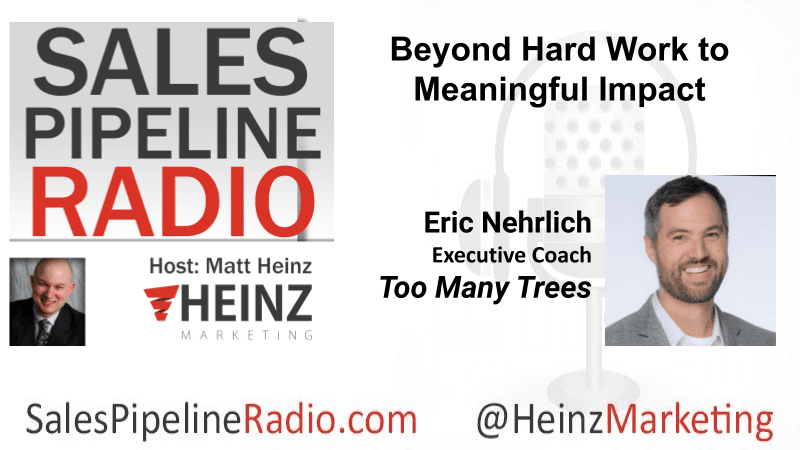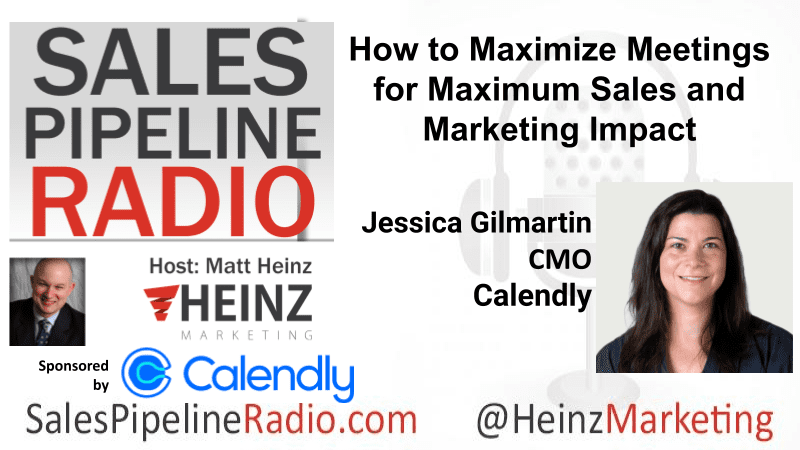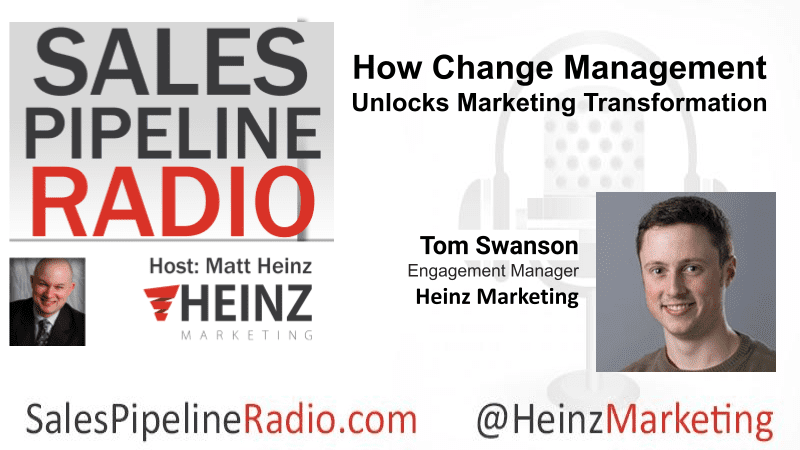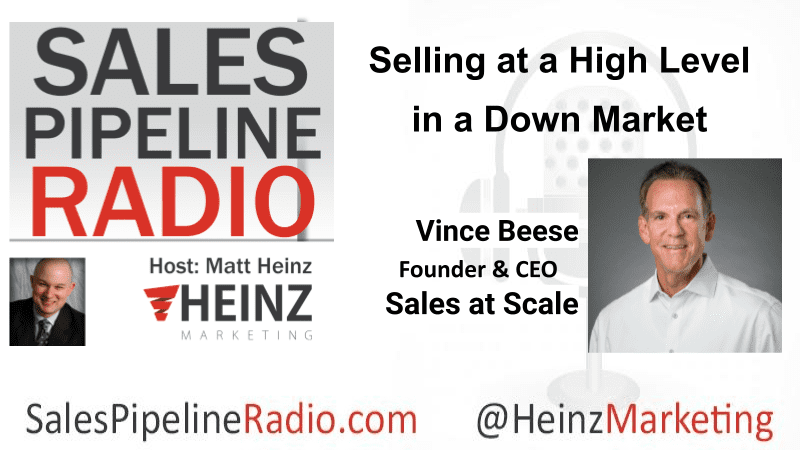Sales Pipeline Radio, Episode 353: Q & A with Eric Nehrlich

Summary
Matt interviews the best and brightest minds in sales and Marketing on Sales Pipeline Radio.
By Matt Heinz, President of Heinz Marketing
If you’re not already subscribed to Sales Pipeline Radio or listening live Thursdays at 11:30 am PT on LinkedIn (also on demand) you can find the transcription and recording here on the blog every Monday morning. The show is less than 30 minutes, fast-paced and full of actionable advice, best practices and more for B2B sales and marketing professionals.
We cover a wide range of topics, with a focus on sales development and inside sales priorities. You can subscribe right at Sales Pipeline Radio and/or listen to full recordings of past shows everywhere you listen to podcasts! Spotify, iTunes, Blubrry, Google Play, iHeartRADIO, Stitcher and now on Amazon music. You can even ask Siri, Alexa and Google or search on Audible!
This week’s show is entitled, “Beyond Hard Work to Meaningful Impact“ and my guest is Eric Nehrlich, Executive Coach at Too Many Trees and author of “You Have a Choice: Beyond Hard Work, Meaningful Impact.“
Tune in to:
- Hear Eric’s personal story of hitting rock bottom while working a high profile job at Google
- Learn the importance and consequences of making intentional choices in life
- Explore the challenges of prioritization, the fear of missing out, and the impact of these choices on one’s well-being and fulfillment and those they care about the most.
- Recognize burnout before it’s too late for you and those around you.
Watch the video, listen in below and/or read the transcript below.
Matt: All right. Well, welcome everybody to another episode of Sales Pipeline Radio. I’m your host, Matt Heinz. Really excited to have you here. I’ve got a great guest and a great topic today. If this was the eighties in a sitcom world, Eric, we just need a very special episode of sales. We’re not going to talk about pipeline.
We’re not going to talk about demand gen, but something that I would argue is much more important. If you’re watching us live today watching, thanks so much for joining us in the middle of your workday in the middle of work week. You can be part of the show. If you’re listening and watching on LinkedIn or YouTube, put a comment in, we will see that we can respond to that comment, question for Eric. It can be a rebuttal on what you’re seeing and hearing today. We’d love to hear and see that if we like it, we’ll reference you can bring you up on the show here. So thank you very much for participating as y’all always do. If you’re listening, watching on demand, thank you so much for downloading and subscribing every episode of Sales Pipeline Radio, you can find past, present and future at salespipelineradio.com. I’m very excited today to have speaker, author, Eric Nerlic. I’m excited for the talk about his new book. You can see it behind them. And I’ve got a copy here. “You Have a Choice” Beyond Hard Work, Meaningful Impact. I, I’m forgetting now where and how we got introduced, but I think I read this book and, you know, a handful of times, you know, you read something that really has deeper meaning than just what we’re trying to get done day to day.
sometimes we have an opportunity to learn from people that not only bring us that wisdom, but unfortunately have lived part of that hard life that they’re trying to help the rest of us see in the void as well. So. Thank you for doing this and being here. start with your background, your origin story, which I think really sort of sets up and introduces the book and the topic.
Eric: Yeah. Well, first of all, thanks Matt for having me on the show. I’m really excited to be here and have a chat about this. A little over 10 years ago, I was working at Google and burning out badly. I’ve been working 80, a hundred-hour weeks for too many years, a couple, three years at that point.
And there’s only so long you can actually maintain that pace. And my body physically gave out at some point and I was lying in bed sick and going, what am I doing with my life? I had been so focused on earning a promotion that I had like sacrificed everything. Didn’t have time to see my friends.
I didn’t have any hobbies outside of work. I didn’t see my family. In fact, the time when I broke down was Christmas. I’d planned to go see my family and instead I was lying in bed, sick with 103-degree fever is this the life I want? I mean, I’ve worked so hard for this promotion.
I’ve been putting in everything I could for three years to get this promotion. And it’s so important to me, but why? I didn’t have a good answer. It was just the next thing on the list. You know, you get good grades to go to college, get good grades in college, get a job. You get a job to get the next job.
You go to the next job, get a promotion. You next step, next step, next step. It’s always been about hitting the next step. But then I finally questioned, do I want this next step? What am I giving up to get, to this next step? And in that moment, I realized that I had a choice. I could keep doing what I was doing and destroying my body and giving up all my social connections, or I could start saying no to my job.
And that was the first time that had ever occurred to me as a possibility. It was like, wait, is that something I could do? I don’t know. I’ve never considered this idea, but I tried it out. For some reason, I was at the point where I was ready to try it out. And I went into my first one on one in January and I told my manager.
I’m not going to work that hard anymore. They’re like, what do you mean? I’m done, not doing that anymore. They’re like, well, are you saying you can’t handle the work? I’m like, yeah. Okay. Well, if you can’t handle the work, I’m going to find somebody that can. understood. That means you’re not getting that promotion.
if you can’t handle the work, you’re not meeting expectations. I’m that is what that means. And so that’s what happened. They took away half my team. My performance rating got slashed. I lost my chance of promotion. And all of my fears had come true. I’d been worried that was going to happen.
I was going to lose the respect, lose my team, lose all these things. And it all happened. And the part that was amazing was that it felt great. I felt freedom after that. I had a life back. I could go see friends. I could take up hobbies. I could see my family. And I realized, oh, these are consequences I’m willing to accept.
It’s taking a step back in my career to embrace the rest of life. And that realization almost over a decade ago now has led me now to a place where I live a life that I control, that I want, where I do stuff that is meaningful to me each day, make enough money to get by, have time with my family, and generally live a pretty good life.
I’m pretty happy with my life. And this book is my attempt to share what I went through in my own journey and what I’ve shared with my coaching clients. I’m an executive coach that works with leaders to be more impactful. And what I’ve learned in my own life and what I’ve learned coaching others is now embodied in this book.
Matt: It’s such a powerful story. I have so many questions. We’re just going to scratch the surface on this I just encourage everyone to read the book to be inspired by Eric’s story and really think hard about what part of that story might be part of yours.
I think there was a lot of long time, Eric, where my wife knows this now, I would say, Oh, you and family are first, but they weren’t. Work was what gave me joy, you know, and but in the idea of a promotion, the idea of what came next, the idea of making more money that was it.
And, you get to a point where you’re like, is this really all life is about? Is this really why I’m here? And I think for people that are still focused on the hustle and focus on the hard work and the next step and look, all [00:06:00] power to ’em, everyone’s got their thing, that’s fine.
But I think to be able to think about, if they were to step back and say, I don’t need that promotion, I don’t need that next step. There’s a fear of missing out. There’s a fear of what you’re not going to have because Eric, you could probably have more riches and bigger houses and boats and whatever, if you would’ve stayed on that track.
But there’s a difference between what you missed out on and what you get instead. And that trade off I think is very difficult. It would have been impossible for me to think about that at various stages of my life and career. Can you talk a little bit about that part of it?
Eric: Yeah, absolutely. It was unthinkable. It was something as I said, like I had never considered the possibility that I did have a choice until this critical burnout moment. And There’s this cultural conditioning that more is better. There’s no such thing as enough. I always have to go for more, go for the next, keep on going.
And that’s drilled into us from childhood age. Like we celebrate people that are monomaniacal people. I just put one thing and go for it at all costs. And stepping away from that feels very dangerous. As you said, there’s this fear of missing out. And I mean, I’ll be honest, that was really hard for me.
I mean, I walked away from a very well paying, very prestigious job at Google. I was the chief of staff for the search ads team at Google. So I’m at the time I was running a hundred billion dollar plus business. Like there’s nothing I will ever do. That’s bigger than that. And I was getting paid a lot of money to do it.
And I walked away from that to become a self employed coach. I make a fraction of what I used to make and I’m home at 6 PM every day to be with my kids. And I actually enjoy myself each day. I’m not stressed out every day going to work. I was willing to make that trade. And not everybody will be. That’s fine.
Make the choices intentionally is what I’m asking people to do and realize what options you’re not considering, because something I say in the book is like, every day you show up at work as a choice, you can just quit that day and you don’t cause there’s consequences. You have to figure out the financial situation.
You have to figure out insurance, but that’s still a choice. Then it becomes like, Oh, I’m showing to work because the financial security and the insurance are worth more to me than the freedom. Okay. That’s the choice I’m making. Sometimes it’s not an easy choice. I’ve locked myself in with financial commitments.
I bought a too big a house. So now I have a huge mortgage I have to pay. That’s a choice also. I may have to keep this job that pays me a lot of money, but I hate to pay that mortgage. Or I can move to a smaller house, take a different job. It’s not easy choices. I think that’s the part of people miss.
It’s like, well, it should be an easy choice. I should be able to have everything I want. I should be able to do it all. And at a certain point you have to make choices and tradeoffs and priorities. So that’s what I think the real message of the book is. Make those choices intentionally.
Matt: I would imagine that there are people that you worked with at Google that both thought and maybe still think you’re nuts, but also are envious of the life you’re living now.
And for people that look at that and think of that as a choice and think, well, what will people think if I give up on this path? What will people think if everything I work towards everything I’ve worked for, I walk away from? As I say that, I hope that other people think, okay, that sounds more like it’s more about me than about them.
It sounds more about my ego necessarily than what anyone else thinks and who cares what everyone else thinks? But that’s a big barrier for people to get through. Have you experienced some of that? And I’m curious, forget people that have read the book, people you worked with, people on that Google train with you, has that had an impact and in conversations and experience that you’ve had with them and that they’ve had themselves?
Eric: Yeah. So a few things come to mind. So about a year before I left Google, my manager sat me down and said, okay, to get your next promotion to director, I see this opportunity for you. Here’s this greater scope you can take on. You can take on this and this and this, and that’s how we’re going to get you promoted.
And I looked at her and said “Nope”. She was like, what do you mean no? I don’t want to get promoted. What, what do you mean you don’t want to get promoted? I’m like, no, I don’t want more scope. I’m happy with what I have. I’m in a good place in life. I don’t want to change that. And it just, she just looked at me.
She couldn’t understand what I was saying. Of course you want the next promotion. That’s the way this works. You have to want the next promotion. She just like, couldn’t understand that I was telling her, no, that’s not what I want. So that’s an example of like people that just didn’t get it.
But what will people think? And the real question I have is, which are the people that matter? There was one person that mattered in this decision. My wife. Because she was going to be impacted. We were pregnant with our first child. And I was like. I’m thinking about leaving Google to become a self employed coach.
And I know that’s probably irresponsible. I’m supposed to be a provider. We need the money so forth and so on. And she was like, yeah, of course you should do it. Quit Google. I’m like, I’m sorry, what? I’m fortunate. My wife’s an engineer at Apple. We’re fine. Like, even if I didn’t make money, we’d be fine.
But she was like, look, I see you on the days when you come back from your Google job and you’re stressed and you’re exhausted and you’re miserable. And I see on the days when you do even one coaching call and you’re lit up, you have energy. You’re excited about the world. And that’s the man I want to be in my life.
I’m like, Oh my God, I love you so much. First of all, but she was a person that she had to live with the consequences. Other people, my mom was like, how could you give up Google? This is the culmination of your career. This is everything you’ve been working for your whole life. I’m like, yeah, and I’ve been there and I’ve done that and I’m done.
So I think it’s really important to separate people from who is going to be affected? Who really needs to be in on the decision?
Matt: Talking today on Sales Pipeline Radio with Eric Nehrlich author of this fantastic book. “You Have a Choice”
You talked about this rock bottom that you hit 10 ish years ago. And would hope that not everyone would have to get to a rock bottom to see this as a choice; to see this as something they can do. What are some of the warning signs that people may be approaching rock bottom?
What are some of the things they should be looking for that maybe they see in the mirror that can be indicators that your body is about to revolt, you are reaching a point at which this could be a threat to your existence.
Eric: Yeah. I was just actually talking to a client earlier today that was in that downward spiral where he had too much to do at work.
So he was working long hours. So he was stressed out. So he wasn’t sleeping well, which meant he was less productive the next day, which meant things took even longer when he got further behind. And I’m like, this will not end well for you. There’s no, there’s no way this ends well for you because it’s like, you’re getting further and further behind each day you work because you’re tired because you’re exhausted and you’re still accepting new commitments. And that was what I counseled him on. At some point you have to say okay, I am overcommitted. I cannot deliver on everything I’m being asked to deliver on. And that may sound like, oh, I could never say that.
And that’s the real fear of people. Like, well, if I say that to my manager, they’re just going to fire me. And they might, and that’s a risk. And that’s the question are you willing to take that risk? But if you come back and you say like, you know what, I have these 10 things on my plate. These three seem like the most urgent and most important.
How about I commit to getting those three done in the next week. And then we look at the rest of the list next week. That shows prioritization, that shows initiative, that shows leadership. And it’s the only way to get out of this thing. Cause if you’re trying to do all 10, you’re going to do all 10 badly, but if you pick three and say, I’m going to deliver on them, you’re going to show dependability.
You’re going to show forethought, you’re going to show that you can deliver on your commitments. And I think that is so critical. But again, I didn’t figure this out until after I burned out my next job, when I was this chief of staff at Google, I had this relationship with my manager where I could say like, yeah, okay, these are the three things that got going on this week.
You just asked me to add this thing. What can I drop of the three? And we would have that conversation and I was very upfront about it. Cause that way I knew I wouldn’t get overwhelmed, but it took me hitting rock bottom to really learn to have that conversation.
Matt: You hit rock bottom and didn’t immediately quit Google, you just started prioritizing yourself and pushing back and you lost the trajectory you’re on but you still worked at Google. Sometimes I think you have these black or white expectations that either I follow this path and keep my career or I’m dead or I have nothing right. And it’s never that level of trade off. I think people feel if I say no to that sixth thing, if I say no to this extra work, then my boss is going to fire me or was no longer going to believe in me.
That’s rarely the case either, right? It’s somewhere in the gray area, but in that gray area, you’re able to prioritize what you want. And the more you do that, the more that muscle builds and the more you’re able to advocate yourself with confidence. To find that right balance.
Eric: Yeah just kind of building on that,
who are the people that matter? And this is so important in a work environment. if you’re saying yes to everybody, you’re going to get overwhelmed. Especially if you’re competent, this is the curse of being competent. More work flows to you because you’re competent.
You do good work. The reward for good work is doing more work. So then at some point you have to say like, okay. Who do I really need to deliver on? I’m going to deliver for my manager, my VP and other people will have to wait. And that is a skill that most people don’t learn.
They’re either like, I have to say yes to everybody, or they start indiscriminately saying no, and they like piss off the people that are really the important stakeholders. So learning to prioritize, these are the people requests come first. Everybody else has to wait. That’s another really helpful skill as you progress in your career.
Matt: Got just a few more minutes with Eric Nehrlich. He’s the author of the book, You Have a Choice, Beyond Hard Work to Meaningful Impact. So we’ve been talking mostly about this self-realization, right?
The path you were on you’re coaching to help people see this for themselves. Let’s say someone listening is a manager seeing someone at the risk of burnout, seeing someone who is, Icarus getting a little too close to the sun. How do you recognize that? And is there an appropriate way to have a conversation with them?
Look for some people, they just might want to keep doing that. But how do you have a conversation as a manager, as a boss, as a leader to help people see where the right balance is for them?
Eric: That’s a tough one. I think partially it depends on what is the relationship you’ve already built with that person, have you shown that you care about their welfare?
Otherwise it can come across like, how do I get more work out of you? And that can come across the wrong way. So, and it also matters how you show up. Like, what do you do? Are you working all hours of the day? That manager that asked me, if you can’t handle the work, I’m going to find somebody that can.
They were working, I don’t know, 16, 17 hours, most days. And that was the example they were setting. And they just said yes to everything. My later manager, the one that I was chief of staff for, he could prioritize. He’s like, okay, this is what I’m going to get done this week. And I’m going to say no to everything else.
He could say like, yep, we’re going to rejuggle. And this is what I’m going to deliver. Cause this is the time I have available and I’m going home to my family at 6 PM. And he did as a VP at Google, which was not that common. But to your question, like, how do you handle it? I think you look at it and say like.
Hey, it seems like you’re not always delivering on the things that you say you’re going to deliver. It seems like you’re overcommitted. What can we do? And this “we” is really important. We are going to work on this. Because it’s not, you’re doing bad. You’re not delivering. It’s Hey, it feels like I’m giving you too much to do cause you’re not always delivering on what we agreed to. How can we work on that together?
Matt: Awesome. Well this has been amazing. I’d highly encourage you for yourself, for those that you love. Get a copy of this book. “You Have a Choice”. I got mine on Amazon. I’m sure there’s lots of places you can get it online, but definitely go give it a shot, Eric. Thanks so much. Where else can people learn from you?
What are the things you’re thinking about writing about working on now?
Eric: Yeah, the best place to find me on the web is toomanytrees.Com. From there, you can sign up for my newsletter, which I send out every couple of weeks to share what I’m thinking about, learning about reading about all in this area of personal development and leadership.
So I would love to share those insights with you.
Matt: Awesome. Thank you, Eric, so much for being here and for sharing your story, both, here and in the book. this is the stuff I think at the end of the day, some of the most important conversations we have with and for each other.
Thank you everyone for listening and watching. We’ll be back next week for another episode of Sales Pipeline Radio. My name is Matt Heinz. We’ll see you then take care.
Listen to the Latest Episodes:
Matt interviews the best and brightest minds in sales and Marketing. If you would like to be a guest on Sales Pipeline Radio send an email to Sheena@heinzmarketing.com.



